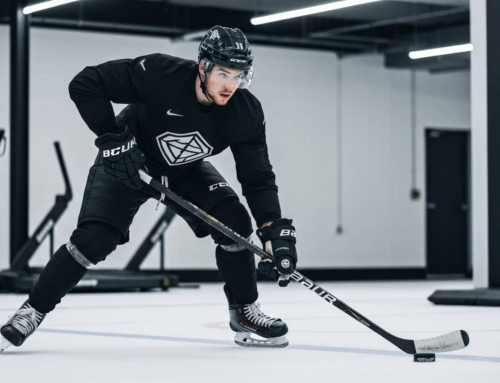Cultivating Success: Developing Hockey Captain Leadership Qualities
The Unseen Power of Leadership in Hockey Success
In the fast-paced, high-stakes world of hockey, skill and strategy are undoubtedly critical. However, beneath the surface of dazzling plays and powerful shots lies an even more fundamental component of team success: leadership. Beyond the coach’s directives, the on-ice presence of a strong captain can elevate a team’s performance, resilience, and overall cohesion. It’s not merely about wearing a letter on a jersey; it’s about embodying a set of qualities that inspire, motivate, and guide. Understanding and actively developing Hockey Captain Leadership Qualities is paramount for any aspiring leader or coach looking to build a winning culture.
A true hockey leader doesn’t just call out plays; they cultivate an environment where every player feels valued, understood, and driven towards a common goal. This influence extends beyond game-day heroics, shaping practice intensity, locker room morale, and the team’s response to adversity. Ultimately, the captain’s leadership can be the invisible force that binds individual talents into an unstoppable collective.
Defining the Core Qualities of a True Hockey Captain
What exactly defines a true hockey captain? It’s a blend of character traits and practical abilities. At its core, a captain is a leader by example. They are the first on the ice for practice, the last to leave, and consistently demonstrate unwavering effort and dedication. This consistency sets a high standard for the entire team.
Key qualities include:
- Accountability: A captain takes responsibility for their actions and holds teammates to the same standard, fostering a culture where everyone is answerable for their performance and conduct.
- Communication: Effective captains are excellent communicators. They articulate instructions clearly, offer constructive feedback, and facilitate open dialogue between players and coaches.
- Composure: In high-pressure situations, a captain remains calm and focused, providing a steadying presence when emotions run high.
- Empathy: Understanding and relating to teammates’ struggles and successes builds trust and strengthens team bonds.
- Selflessness: A captain prioritizes the team’s needs over individual accolades, willing to make sacrifices for the greater good.
- Resilience: The ability to bounce back from setbacks and inspire others to do the same is crucial, especially during tough stretches of a season.
Leading by Example: On-Ice Influence and Tactical Acumen
On the ice, a hockey captain’s influence is immediate and visible. They are often the most reliable players, performing consistently in all zones. This doesn’t necessarily mean being the top scorer, but rather demonstrating unwavering effort, smart decision-making, and disciplined play. They are the ones who dig pucks out of corners, block shots, and finish checks, inspiring teammates through their sheer will and work ethic.
Beyond individual effort, a captain often possesses strong tactical acumen. They understand the game plan intimately and can make real-time adjustments. They’re capable of organizing defensive zone breakouts, directing forechecks, and ensuring proper positioning during special teams play. This tactical awareness allows them to guide teammates, offering quick advice or subtle cues that can turn the tide of a shift or a game. Their ability to read the flow of play and adapt makes them an extension of the coaching staff on the ice.
Building Team Cohesion: The Off-Ice Role of a Captain
The captain’s role extends far beyond the rink. Off the ice, they are instrumental in building and maintaining team cohesion. This involves fostering a positive locker room environment, mediating disputes, and ensuring that new players feel welcome and integrated. They organize team-building activities, encourage camaraderie, and act as a bridge between the players and the coaching staff.
A captain’s off-ice leadership might include:
- Facilitating team meetings to address concerns or celebrate successes.
- Mentoring younger players, offering advice on navigating the challenges of the game and life.
- Ensuring open communication channels, so players feel comfortable voicing concerns or ideas.
- Organizing team dinners, outings, or charitable events that strengthen bonds away from competitive pressure.
- Being a moral compass, upholding team values and ensuring respectful conduct.
This holistic approach to leadership ensures that the team functions as a united unit, on and off the ice.
Practical Strategies for Developing Hockey Captain Leadership Qualities
While some players may appear to be natural leaders, the qualities of a strong captain can absolutely be developed and refined. For players aspiring to leadership, and for coaches aiming to cultivate leaders within their ranks, intentional strategies are key.
Here are some practical strategies for developing Hockey Captain Leadership Qualities:
- Assign Leadership Tasks: Even without a letter, give players opportunities to lead. Rotate captains or assistant captains in practices, assign them responsibility for drills, or put them in charge of warm-ups.
- Encourage Communication: Foster an environment where players are encouraged to speak up, share ideas, and provide constructive feedback to one another. Coach players on effective communication techniques.
- Role Modeling: Coaches and senior players should consistently model the desired leadership behaviors – work ethic, respect, accountability – both on and off the ice.
- Decision-Making Practice: Create scenarios in practice that require players to make quick decisions, both individually and as a group, and discuss the outcomes.
- Feedback and Mentorship: Provide regular, constructive feedback on leadership efforts. Pair aspiring leaders with experienced mentors who can share insights and guidance.
- Off-Ice Development: Encourage participation in team-building activities, community service, and discussions about character and values.
- Promote Accountability: Teach players to hold themselves and their teammates accountable for effort, discipline, and adherence to team rules.
These practices, consistently applied, can significantly aid in shaping effective leaders.
Navigating Challenges: Supporting Your Team Through Adversity
One of the most defining aspects of a captain’s role is their ability to guide the team through adversity. Hockey seasons are long, filled with slumps, injuries, tough losses, and personal challenges. In these moments, a captain’s leadership is tested most profoundly.
A strong captain will:
- Maintain Positivity: Even when faced with setbacks, they project a confident and resilient attitude, preventing negativity from spreading.
- Problem-Solve: They actively engage with teammates and coaches to identify the root causes of struggles and work towards solutions.
- Unite the Locker Room: Adversity can sometimes cause fractures. A captain works to keep the team united, emphasizing collective responsibility and shared goals.
- Offer Support: They are a sympathetic ear for struggling teammates and offer encouragement and practical help.
- Lead the Charge: When the team needs a spark, they step up with a big play, a motivating speech, or simply an unmatched effort.
Navigating challenges effectively demonstrates true leadership and solidifies a captain’s standing within the team.
The Lasting Legacy of Exceptional Hockey Captains
The impact of an exceptional hockey captain extends far beyond their playing career. Their leadership leaves a lasting legacy, shaping the culture of a team and influencing players long after they’ve moved on. These captains aren’t just remembered for their statistics or their trophies, but for the way they inspired those around them, instilled values of hard work and camaraderie, and fostered environments where teammates could thrive.
From youth hockey to the professional leagues, great captains are often seen as mentors and role models, whose lessons in leadership, resilience, and teamwork resonate for years. They teach their teammates not only how to win but how to be better people. The principles of developing Hockey Captain Leadership Qualities contribute not just to sporting success, but to the growth of well-rounded individuals prepared for leadership roles in all aspects of life.
Have questions? Contact us here.

We use only the finest ingredients to produce stellar tastes.










